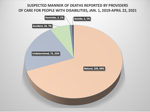Missouri fails to adequately shield these with developmental disabilities from abuse, neglect | State Information
Carl DeBrodie’s family hadn’t seen him for months when his remains were found encased in concrete in a Fulton storage unit in April 2017. What they discovered in the weeks following was even more horrifying.

Carl DeBrodie
DeBrodie, 31, was a developmentally disabled man living at Second Chance Homes, a care facility in Fulton that had a contract with the state.
Two caretakers at that facility, Sherry Paulo and Anthony Flores, were charged and convicted on civil rights and obstruction charges in connection with DeBrodie’s death. They forced DeBrodie to come to their home multiple times to do chores, fight another Second Chance Homes resident for their entertainment and sleep on their basement floor, according to court documents in a wrongful death lawsuit filed by DeBrodie’s family. The two also admitted watching DeBrodie’s health deteriorate, but they still removed him from his prescribed medical regiment.

Sherry Paulo

Anthony R. Flores
Some time between Oct. 25 and Nov. 24, 2016, according to court documents, DeBrodie suffered a seizure at Paulo and Flores’s home. They found him screaming, convulsing and bleeding from the nose in the middle of the night, but they failed to call emergency services or try to save his life. DeBrodie died that night. The two hid his body for months, the documents allege, and eventually filed a missing persons report two days before DeBrodie’s body was found at the storage unit.
In the wake of DeBrodie’s highly publicized death, the Missouri Developmental Disabilities Council, a federally funded council appointed by the governor to advocate for the developmentally disabled and advise on policy, released a statement.
“The Council has been following Carl DeBrodie’s story and has high expectations that once all investigations are completed that there will be justice for Carl and that there will be necessary systemic changes implemented so that others may avoid such a gruesome death and lived experience,” the 2018 statement read.
Valerie Huhn served as director of the Division of Developmental Disabilities from 2014 until she was promoted in 2020 to deputy director of the Department of Mental Health. She said that in response to DeBrodie’s death, the division has placed a greater emphasis on employees’ roles as mandatory reporters of abuse and neglect, worked to close communication loops, updated their abuse and neglect informational guide and changed the language in division policies to make them more “easy and readable.”
The Division of Developmental Disabilities is a branch of Missouri’s Department of Mental Health. It’s responsible for the care of developmentally disabled people such as DeBrodie who cannot care for themselves. These disabilities include cerebral palsy, Down syndrome, autism and epilepsy. The division operates care facilities and contracts with third-party agencies. This is paid for through Medicaid.
Years after DeBrodie’s death, a close examination of division policy and interviews with officials and front-line staff suggest little has changed in Missouri’s developmental disability system to detect or prevent abuse and neglect. Families with developmentally disabled loved ones in state care and employees working in the field describe a system that is still deeply flawed.

Source: Missouri Division of Developmental Disabilities
State records back this up. From Jan. 1, 2019, to April 22, 2021, 24 developmentally disabled people died in accidents in Missouri-operated or -contracted facilities, according to data obtained through a Sunshine Law request. The data also showed 701 reports of verbal, sexual or physical abuse and neglect in that time period.
No significant changes
“Nothing’s changed,” said Dina Lester, a registered nurse from Kansas City who worked with the division for almost 10 years and remembers DeBrodie’s death.
Lester’s job was to complete monthly nursing assessments of developmentally disabled people and teach a class on medications for new caretakers. She left in January 2020, partly because she was disappointed with the lack of change and oversight in Missouri.
The Division of Developmental Disabilities outlines division policy via a set of guidelines. One of them, Guideline No. 68, was created in November 2017, seven months after DeBrodie was found dead. It outlines the inquiry process for complaints of abuse and neglect — in addition to misuse of funds or property — and how they should be investigated.
This system existed before the DeBrodie incident, but the division rewrote the guideline to make it more “easy and readable,” Huhn said.
Department of Mental Health spokesperson Debra Walker said in an email that the procedures didn’t change after DeBrodie died. The division simply created a new guideline to better explain them.
Lester, however, called that ineffective “lip service.” She said she has made multiple complaints through the process to the Kansas City Regional Office and has seen no action.
Lester provided the Missourian with screenshots of specific email complaints she made.
The biggest problem, Lester said, is that reports are made by the agencies themselves which have a vested interest in hiding neglect and abuse.
And it’s not just the Kansas City region that has these problems. One woman, who has worked as a care provider at six different agencies in and around Poplar Bluff, said the process is “basically for show.”

Data from the Missouri Division of Developmental Disabilities also shows there were four investigations during this time period for neglect and physical abuse, and one each for misuse of funds/property and verbal abuse; sexual abuse and verbal abuse; neglect and verbal abuse; and neglect and sexual abuse.
“Whenever things are brought to their attention, it’s usually swept under the rug,” she said. Like several front-line workers the Missourian spoke with, she asked to remain anonymous for fear of losing her job.
Huhn said the division doesn’t have exact numbers for how many times the process has led to a person with a disability being removed from a potentially neglectful or abusive situation, but she said care providers usually self-report and intervene before the division has to do anything. Typically, the provider separates the staff member from the developmentally disabled person they hurt, she said, adding that staff members are sometimes terminated or put on administrative leave.
Another woman, who works at a care-providing agency in Kansas City called Center for Developmentally Disabled, said it doesn’t always happen that way.
“The problem is that agencies are not reporting,” she said.
The woman, who also asked to remain unnamed, works as a program specialist. The Center for Developmentally Disabled is one of the largest agencies in the state that cares for the developmentally disabled. It has several facilities, some of which are group homes while others are independent supported living facilities where one to three patients live with the assistance of caretakers. Her job is to supervise managers at one or two of these facilities at a time.
She said that at her agency, she’s asked on several occasions that a staff member complete an event report after a patient was not administered medicine they were supposed to receive, yet staff members have failed to do so. Eventually, she just completes the report herself, she said, but she knows that some slip through the cracks.
She also said staff members have found bruises on patients, but management couldn’t prove a staff member caused them because patients are sometimes nonverbal or otherwise unable to answer questions about who — if anyone — hit them. So management uses that gray area to justify not reporting it.
When no report is made, she said it’s easy for care providers to hide abuse or neglect.
Guideline No. 68 specifies that inquiries into abuse or neglect be done when an event report is filed within 24 hours of the incident. That means if a report isn’t filed promptly, it likely will never result in an investigation.
Huhn said most providers’ employees are legally obligated to report abuse or neglect, but both the Kansas City and Poplar Bluff care providers said they’ve seen mandatory reporters fail to do so.
Other than No. 68, none of the department’s guidelines regarding care facilities for the developmentally disabled have been revised since April 2017 when DeBrodie’s remains were discovered.
For example, Guideline No. 54 outlines procedures for the division’s regional offices to do quality reviews that involve face-to-face interviews with patients to determine their quality of life. The guideline was in place during DeBrodie’s time at Second Chance. Still, the guideline hasn’t been revised since it was created in July 2015. Walker said that between the guideline’s 2015 creation and DeBrodie’s 2017 death, no Second Chance Homes residents took part in one of these reviews.
The Poplar Bluff care provider said she’s never seen one done. Neither has the care provider who works at the Kansas City agency.
Huhn said yearly audits are another way to ensure facilities’ quality of care.
The Kansas City care provider said facilities run by the Center for Developmentally Disabled have undergone audits. The problem, she said, is that facilities are given advance notice and told what records will be inspected. That gives them time to make sure records are in good shape, schedule last-minute doctor’s appointments and make sure any required lab tests have been completed.
“If documentation isn’t there, then they have time to look and they have time to call doctors’ offices and make appointments,” she said. “They have time to get documentation that’s not there.”
The Poplar Bluff caretaker said that’s how it works, too.
“The problem is that they don’t have a separate entity that has no skin in the game to come in unannounced and review records or look at processes,” Lester said. “There’s nobody that does that.”
Lester and the two agency employees believe the department should adopt tracer methodology, a common practice in U.S. health care facilities. It involves an independent group visiting facilities unannounced, interviewing random staff, checking random records and evaluating the facility.
Walker said in an email that the division doesn’t use tracer methodology because “the Division is confident in its developed process to review individuals’ experiences of care and to identify provider performance issues.”
In addition to the guidelines, facilities such as the one DeBrodie was in must follow rules and protocols established in the Division of Developmental Disabilities’ Targeted Case Management for Individuals with Developmental Disabilities Manual. The division refers to this manual mostly in regards to billing, but it also contains guidelines for care providers that the DeBrodie family’s wrongful death lawsuit alleged were violated.
The manual has been updated multiple times since April 2017, most recently in April 2019. None of the established systems that failed to prevent the neglect, abuse and death of DeBrodie have changed.
One of the safeguards was a requirement that officials and medical personnel check on DeBrodie regularly. As required by Division Directive 3.020, an employee of Callaway County Special Services and a registered nurse were instructed to conduct monthly face-to-face visits to DeBrodie to verify his well-being.
This nurse was Melissa DeLap, and the county employee was Tiffany Keipp. Although neither made face-to-face contact with DeBrodie, they filed false reports claiming they did, according to the wrongful death lawsuit. DeLap later pleaded guilty in court to health-care fraud and admitted to signing seven months’ worth of false medical reports claiming she’d seen DeBrodie while he was already dead.
No changes have been made to prevent the same failure from reoccurring. The Community RN Manual, which the division uses to train new nurses, has not been updated since January 2006.
Like DeLap, Lester’s job involved performing these monthly medical assessments of people with developmental disabilities. She said nothing about her job has changed since DeBrodie’s death.
Lester described other flaws in the system. One issue, she said, is that even if a nurse tells the facility what needs to be done, there is no guarantee it will happen. Recommendations are made by the nurses, but there is no entity outside of the care agency to ensure these recommendations are actually addressed.
“The nurse can only go in and say, ‘This, this and this needs to be done,'” Lester said. “It is dependent on the agency to make sure the recommendations are followed up.”
Lester said facilities that fail to adopt recommendations from nurses aren’t held accountable. “There’s no consequences when poor care is provided.”
Walker, however, said yearly audits verify that recommendations from nurses are followed.
The Poplar Bluff care provider said that after DeBrodie’s death, the facility where she was working changed its practices regarding monthly nursing assessments. That, however, wasn’t required by the Division of Developmental Disabilities.
Not an isolated incident
Lisa Goodman, 57, had only been living at a Kansas City group home for about two months when she choked and died, according to the Center for Developmentally Disabled employee who cared for her for two years before she was transferred to that group home.
“I was in shock,” she said of learning the details surrounding Goodman’s death.
Goodman was from Warrensburg. Her disability prevented her from eating solid food and required a special diet so she wouldn’t choke. One day in July 2019, her caretakers gave her a hotdog, and she choked on it, the caretaker said.
Her caretakers weren’t there to provide life-saving procedures despite the fact that her prescribed care plan required a caretaker to supervise her while she ate.
An investigative report obtained from the Jackson County Medical Examiner’s Office confirms that Goodman died from asphyxia due to choking July 27, 2019.
Goodman is just one of many people with disabilities who have died in Missouri’s care.
State records obtained by the Missourian show that from Jan. 1, 2019, to April 22, 2021, there were 923 deaths of developmentally disabled people in Missouri’s care. Of those, the division categorized 766 as “natural” deaths. Twenty-four were categorized as accidents, two as suicides and three as homicides. The records list the cause of 128 deaths as “undetermined.”
Walker explained in an email that the care provider determines the suspected manner of death and reports it to the division. Lester, however, questions whether providers are qualified to make the determination.
“What kind of education do they have to be able to determine that?” she asked. “As a nurse, I couldn’t do that, and I probably have more education than most of the care providers do.”
The records also show that from Jan. 1, 2019, to April 22, 2021, there were 701 reports of verbal, sexual or physical abuse or neglect.
Lester thinks the real number is higher.
“I would say most of the time it goes unreported,” she said. “The problem is that when they’re living in group homes or they’re living in independent living situations, there’s no oversight, so they’re free to do what they want to abuse these clients, and nobody’s going to know any different, or people are going to overlook it just because they’re desperate for staff and all that kind of stuff.”
Huhn admitted that because of the coronavirus pandemic, which prevented people who might report these incidents from visiting, the numbers in 2020 may be an undercount.
Lori Latta’s son, Jeffrey, 50, who was born prematurely with cerebral palsy and autistic tendencies, lived at the Higginsville Habilitation Center from 2010 to 2014.
Latta said she saw a clear decline in her son’s well-being over the four years he lived there.
“He used to say 200 words and walk, and now he’s in a wheelchair and diapers, and he won’t say a word hardly,” she said.
Latta never wanted her son in the facility. Latta was a working single mother, and in 2010, the state took Jeffrey from her home through a court order. She didn’t regain guardianship of her son until four years later.
She was horrified by the number of drugs he was prescribed in the facility.
Latta said that one day she visited her son at the Higginsville facility, and he was “having a little bit of a fit.” His caretakers were having difficulty getting him to cooperate, and she watched one of them wrestle him on the ground and force a handful of pills down his throat while he screamed and cried.
Latta said when he finally left the facility, Jeffrey was emaciated and unhealthy. He gained 20 pounds within a couple months of being home.
Latta has some terrible fears about what might have happened to him at the habilitation center. She said he became more withdrawn and reserved. Her pastor noticed the same things, she said.
“Jeff was just a number down there,” she said.
A deeply flawed system
Lester said the flaws in Missouri’s developmental disability system go beyond the safeguards that failed DeBrodie.
“The quality of care is seriously lacking,” Lester said.
She has a special-needs grandson and, having seen the facilities firsthand, she said there is “no way in hell” she would put him in one of them.
The Kansas City care provider described staff members at her facility forgetting to clean medical instruments between uses, risking infections and patients receiving medicines at the wrong times, receiving them prepared incorrectly or not receiving them at all. She said some coworkers have even seen staff members hitting patients.
One time, she said she wanted to see what was going on during the night at a facility she supervises and found that a staff member had invited a friend to the facility, a violation of the Health Insurance Portability and Accountability Act and the patients’ privacy.
Another time, she said, a patient who was supposed to receive 24-hour supervision was left unattended for a short period of time, and even though there was supposed to be an event report about it, there wasn’t.
“I can’t tell anybody how many times I have told staff ‘you cannot swear at an individual,’ ‘do not raise your voice,'” she said.
The Poplar Bluff care provider said one of her agency’s nonverbal patients had a ruptured appendix but never had surgery for it. Eventually, it got so bad that the infection completely destroyed her appendix. That led to a painful three-month recovery.
Lester and the two agency employees said the Division of Developmental Disabilities doesn’t police behavior like this. They’re disappointed with the division’s leadership.
“There’s no vested interest in creating better quality care, improving the process or holding people accountable,” Lester said, adding that some employees are afraid of being punished for speaking out.
“I know a bunch of people that have worked in this field in Missouri and have been very disillusioned,” Lester said. “But when they started to speak out and raise hell about the level of care that was being provided, they were pushed out.”

